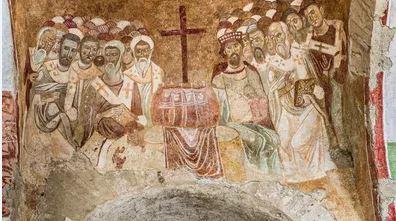Theodot

Theodotus, Valentinian Gnostic
Theodotus is sometimes associated with Valentinian Gnosticism, a significant and influential school of thought in the early centuries of Christianity. Gnosticism, in general, is a broad term for religious and philosophical movements that emphasized secret knowledge (gnosis) as the means to salvation.
Valentinianism, founded by the early Christian teacher Valentinus (c. 100 – 160 CE), was one of the most well-known Gnostic sects. The Valentinians held that salvation came through the acquisition of esoteric knowledge, which was thought to be revealed to a select few. Their belief system typically featured a complex cosmology involving a divine realm of spiritual beings and a lower material realm created by a lesser deity or "demiurge."
Theodotus' Role
-
Theodotus' Background: Theodotus is described as a follower or adherent of Valentinian thought, though not necessarily one of the main leaders or founders. Some sources suggest that he was a Gnostic teacher or even a bishop of sorts in the Valentinian tradition. He is most often mentioned in texts like Irenaeus of Lyons' "Against Heresies" and Hippolytus' "Refutation of All Heresies".
-
Theological Beliefs: Theodotus, like other Valentinians, was likely involved in promoting or expanding the Valentinian cosmology. The Valentinian system saw the One True God as transcendent and unknowable, and from this God emanated a series of divine beings called Aeons. These Aeons populated the divine Pleroma (the fullness of divine presence). The lower, material world was created by a lesser being or demiurge, who was often portrayed as ignorant or even malicious.
-
Theodotus and the Valentinian "Emanation" System: Valentinian Gnostics had a highly developed system of emanations that described the process through which the divine reality came into being, starting from the highest, most abstract divine source and progressively manifesting lower spiritual realms, eventually resulting in the physical, material world. Theodotus would have likely taught along these lines, though his specific contributions to this system are not as clearly documented as those of Valentinus himself.
-
Gnostic View of Christ: Like other Gnostics, Theodotus would have had a distinctive view of Christ. Instead of seeing Jesus as the incarnation of the one true God, Gnostics typically believed that Christ was a divine being sent to impart secret knowledge (gnosis) to humanity, offering a path to salvation through enlightenment. In some Gnostic systems, Christ's crucifixion and death were symbolic of the soul's liberation from the material world.
Irenaeus and the Condemnation of Theodotus
-
Irenaeus was one of the most vocal critics of Gnostic movements, including Valentinianism. He dedicated a significant portion of his work Against Heresies to refuting Gnostic teachings.
-
In Book I of "Against Heresies", Irenaeus specifically addresses Theodotus and other Gnostic teachers, presenting their views as erroneous and heretical. Irenaeus and other early Christian theologians were keen to distance orthodox Christianity from the Gnostic ideas of emanations, dualism, and secret knowledge, which they believed undermined the faith's emphasis on the humanity and divinity of Christ.
Valentinian Gnosticism and Its Legacy
Though Valentinianism itself eventually declined and was labeled heretical by the mainstream Church, its influence was significant in the early Christian period. Valentinian ideas about salvation through secret knowledge, the importance of mystical experiences, and the rejection of the material world as a source of evil continued to shape various later religious and esoteric traditions. Some modern movements and scholars look back on Valentinian Gnosticism as an important part of early Christian history, one that offers an alternative understanding of early Christian theological debates.
Summary
-
Theodotus was a figure associated with Valentinian Gnosticism, a school of thought that believed in salvation through secret knowledge (gnosis) and had a complex cosmology of divine emanations.
-
He was likely a teacher or bishop within the Valentinian tradition, though his specific contributions are not as prominent as those of Valentinus, the founder of the movement.
-
Theodotus, along with other Valentinians, believed in a divine hierarchy of Aeons, the creation of the material world by a lesser being (the demiurge), and a mystical, symbolic view of Christ.
-
Irenaeus, one of the most vocal critics of Gnosticism, condemned Theodotus' teachings as heretical in his work Against Heresies.

